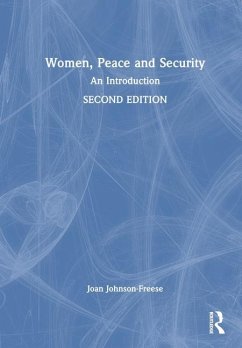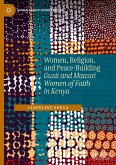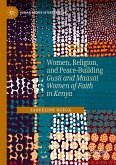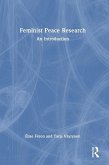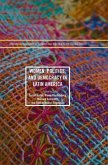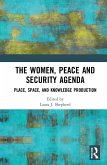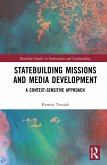This book offers an accessible overview of the issues related to the Women, Peace, and Security (WPS) global agenda. This new edition has been updated and includes new chapters on WPS and Environmental Change and on WPS in Regional and Security Organizations.
Hinweis: Dieser Artikel kann nur an eine deutsche Lieferadresse ausgeliefert werden.
Hinweis: Dieser Artikel kann nur an eine deutsche Lieferadresse ausgeliefert werden.
'Finally, a book that makes a comprehensive national security case for women not just serving in combat roles but being fully integrated into the training pipeline for all roles. As a journalist and government official in war zones, I have witnessed first hand the value women bring to a team, such as building trust in Afghan villages in ways that expand the security perimeter and offering new ways of thinking through complex problems. This isn't about "women's rights" but about what is right to keep America safe and the world more peaceful.' - Eileen O'Connor, former Deputy Assistant Secretary of State and former CNN war zone correspondent
'To the Rumsfeldian category of ''known-knowns,'' Professor Johnson-Freese has added a corollary: ''knowns you were not aware you knew.'' For practitioners of diplomacy, development, and defense, this volume uncovers the roles women now play - or need to play - in securing a more stable and prosperous world. The ideas presented here deserve to be incorporated into education and training programs and become every day practice for diplomats, assistance experts, soldiers, and others engaged, or seeking involvement, in the international security realm.' - Gene Christy, US Ambassador (Ret.)
'Women, Peace and Security: An Introduction - you might think that the author has written yet another book in the whatevernumber-wave feminist or post-feminist debate and so leave on the shelf. DON'T MAKE THAT MISTAKE - the book is essentially about the fundament and solidity of our democracy; a pointed understanding of effective democratic use and democratic control over the tools and mechanics of security policy. This is a must-read for all interested in security policy - professionals and laymen alike!' - Ole Kværnø, Royal Danish Defence College
'Joan Johnson-Freese simultaneously educates policymakers and practitioners that gender equality is a critical dimension of security while empowering these same actors to achieve better security outcomes through their heightened awareness. The reader is treated to an interdisciplinary feast of gender and feminist theory explored and applied in a security context. Her wide-ranging case studies illustrate the phenomenal power the gender lens can wield to understand war, conflict, development, and politics. Women, Peace and Security fills a critical curriculum gap across all dimensions of security studies.' - Marybeth Peterson Ulrich, General Maxwell D. Taylor Chair of the Profession of Arms, US Army War College
'This publication represents a significant contribution to the ongoing discussion on Women, Peace and Security, and moves the debate beyond the confines of the United Nations and embeds it in practical security considerations that governments must grapple with on a daily basis. It exposes the bias that still exists towards the involvement of women in security discussions, operations and activities, and makes a strong case for women as positive actors in guaranteeing security at the community, state, regional and international levels; and not merely as beneficiaries of security.' - Rocky R. Meade, Chief of the Jamaican Defense Force
'To the Rumsfeldian category of ''known-knowns,'' Professor Johnson-Freese has added a corollary: ''knowns you were not aware you knew.'' For practitioners of diplomacy, development, and defense, this volume uncovers the roles women now play - or need to play - in securing a more stable and prosperous world. The ideas presented here deserve to be incorporated into education and training programs and become every day practice for diplomats, assistance experts, soldiers, and others engaged, or seeking involvement, in the international security realm.' - Gene Christy, US Ambassador (Ret.)
'Women, Peace and Security: An Introduction - you might think that the author has written yet another book in the whatevernumber-wave feminist or post-feminist debate and so leave on the shelf. DON'T MAKE THAT MISTAKE - the book is essentially about the fundament and solidity of our democracy; a pointed understanding of effective democratic use and democratic control over the tools and mechanics of security policy. This is a must-read for all interested in security policy - professionals and laymen alike!' - Ole Kværnø, Royal Danish Defence College
'Joan Johnson-Freese simultaneously educates policymakers and practitioners that gender equality is a critical dimension of security while empowering these same actors to achieve better security outcomes through their heightened awareness. The reader is treated to an interdisciplinary feast of gender and feminist theory explored and applied in a security context. Her wide-ranging case studies illustrate the phenomenal power the gender lens can wield to understand war, conflict, development, and politics. Women, Peace and Security fills a critical curriculum gap across all dimensions of security studies.' - Marybeth Peterson Ulrich, General Maxwell D. Taylor Chair of the Profession of Arms, US Army War College
'This publication represents a significant contribution to the ongoing discussion on Women, Peace and Security, and moves the debate beyond the confines of the United Nations and embeds it in practical security considerations that governments must grapple with on a daily basis. It exposes the bias that still exists towards the involvement of women in security discussions, operations and activities, and makes a strong case for women as positive actors in guaranteeing security at the community, state, regional and international levels; and not merely as beneficiaries of security.' - Rocky R. Meade, Chief of the Jamaican Defense Force

